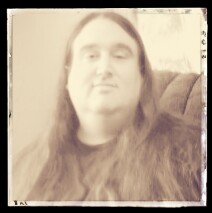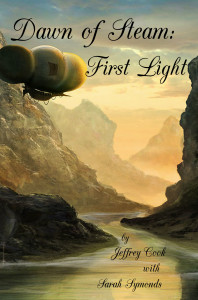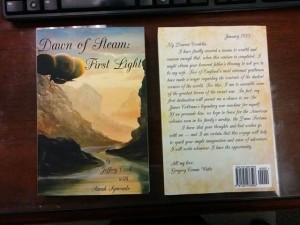Author Interview With Jeffrey Cook
 So, what exactly do you write?
So, what exactly do you write?
At the moment, I’m primarily a steampunk writer. The Dawn of Steam series of books are epistolary format, regency style books of 1800’s style alt-history/science fiction. A story of adventure and travel around the world is told through the letters and journal entries of the people on the trip.
Next year, I’ll be broadening my writing horizons. While the next two books I have coming are both Dawn of Steam, I’ve also got a YA SciFi novel that I’m currently shopping around to agents. I’m working on a fantasy short story for a contest that, based on feedback, may also be turned into a full length novel as well, and finally, have the first couple of chapters done in a fantasy novel tied to a world I do some rpg writing for.
How would you describe yourself in a short third person bio?
From his start in Boulder, CO, Jeffrey Cook ended up traveling and living all over the U.S. and Canada, a narrative that helped inspire some of the ideas in Dawn of Steam. He has since settled in Maple Valley, WA, where he lives with his wife of fifteen years, one housemate, and three large dogs. Outside of writing, Jeff is that rare combo of ex-jock and current geek, spending his limited free time gaming (and occasionally writing for a friend’s rpg company), reading and watching sports.
What made you initially want to write? Has your motivation changed since then?
As my mother likes to point out, I’ve wanted to be a writer since I was about six years old. I was an early reader, both in general, and in terms of picking up full-length novels. Aside from reading, my real inspiration came on a lot of long road trips. My Dad and I passed the time when traveling all day by telling cooperative stories. He’d give me a set up, and I’d make choices for my character, and the story would change as a result. That aspect, combined with reading Voyage of the Dawn Treader as my first full length novel really opened my eyes not only to stories, but my ability to really become a part of the narrative.
What do you think is the most important part of writing?
The discipline to actually get words on the page. A good editor and rewrites can fix a lot of mistakes, but the first advice I’ve pretty much always heard, and try to echo, and try to follow in the face of distractions, is to keep writing. Get at least some practice in every day, even if its 15 minutes and totally off your book’s subject.
What is your favourite part of writing?
I love sharing stories. The whole process of building a world, testing character voices, and then trying to put the pieces together.
Tell us an interesting fact about you.
I’ve always had big dogs around, and now is no exception. Our three “kids” are all rescues, and the dedication in my first book includes my gone-but-not-forgotten sidekick who used to lay at my feet every day while the book was being written, and make sure her younger brothers didn’t come bother me til I was ready to take a break and play with them.
Do you have a day-job, (other than writing)?
Not any more. I was laid off a few years ago, and didn’t have much luck finding something new. That helped prompt me to really get serious about my writing. While being a starting author doesn’t pay much, it does give me the time to make two books a year a realistic goal.
Do you prefer a physical book or an ebook? Why?
I love real books. My work is all tied in with reading or writing on a screen. While I don’t mind that, its just not very relaxing. If I’m reading for fun, I don’t want to be at a computer or on an e-reader.
 Tell us about your latest novel.
Tell us about your latest novel.
Dawn of Steam: First Light is my first book, and the first in a trilogy. The story features a wide cast of characters, but is primarily told from the perspective of Gregory Conan-Watts, a former aide-de-camp and war reporter during the Napoleonic Wars. While it does have steampunk elements, a lot of the book’s focus is on alternate history, both from the perspective of being very close to the real 1810’s in terms of the political and social scene (and featuring a number of real life situations and events from 1815-1820), but also laying the groundwork for some of the common tropes of steampunk. So while it starts very tied to history, the goal, eventually, is to set the stage for a time when female doctors and mechanics might abound, airships become a common travel mechanism, etc.
So, how long does it take you, on average, to complete a first draft?
This book’s first draft didn’t take a lot of time at all. I’d recently been laid off from a job in customer service that ate most of my creative energy. As such, I had a lot of time, and had been needing an outlet for a while. Most of the others, a couple of months. Editing and rewrites take me a lot longer than the initial writing.
Which projects are you working on at the moment?
While waiting to hear back from beta readers for Dawn of Steam: Gods of the Sun, I’ve been working on a short story and an anthology contribution, and have done some very preliminary first edits for the third book in the Dawn of Steam series. Its going to need a lot more before its nearly ready.
How do you come up with the titles for your books? And do you have the final title before completing your book, or after?
The titles really vary. The Dawn of Steam series came about as early-era steampunk, with a goal of setting the stage for what could become any number of other steampunk worlds, so the title for the series came pretty easily. The Accidental Inquisitor as a title resulted from a conversation with friends and someone asking “So what if no one really did expect the Spanish Inquisition, including the Inquisition? How would that work?”
Most of the others get a working title pretty early, which may or may not be the final one.
How has writing changed your life?
I’m poorer than when I was working a traditional job, and I probably work more hours a day, but I’m a lot happier with this job than any other I’ve ever done.
 Where do you get inspiration for writing from? Do you listen to music whilst writing or have a ‘writing cave’?
Where do you get inspiration for writing from? Do you listen to music whilst writing or have a ‘writing cave’?
I hope to have a bit of a cave someday, but space restrictions limit that. I do have my chair, though my space is subject to dog invasions at times during the day. The first thing I do before any new writing project is build a playlist just for working on that book. That helps a lot. I also do a lot of my writing late at night, once people and dogs have gone to bed.
As for my inspirations, those come from all over. As previously mentioned, the idea for the YA SciFi came out of a random conversation. Dawn of Steam came from a waking dream. Masquer’s Dance is tied in with a friend’s rpg company. I like variety, and apparently my imagination does too.
Is there a particular form, style or genre that you’d like to have a go at writing? Why?
Dawn of Steam is definitely my “experiment”. The epistolary format and regency style are definitely their own kind of challenge. I’m really looking forward to adding fantasy to my book list. I’ve read a lot of that, and really enjoy the world-building.
Eventually, though, I’d really like to try more traditional westerns. I grew up on the genre, with my dad having a significant collection of classic western novels. Given how easy it is to blend steampunk with western, though, its more likely I’ll go that route, at least at first.
Favourite book and/or author(s)?
Voyage of the Dawn Treader was my first real novel, and I’ll always have a soft spot for it. I love Tolkien. James Clavell’s Shogun also impacted me, and showed me what you could do with alternate history as a medium. My favorite single novel, though, is Frankenstein.
Do you think it’s necessary to have a degree (of any sort) in order to be a successful author?
I think authors come from all sorts of backgrounds. Experience can be a better teacher than any professor. On the other hand, classes and learned technique can be valuable. I don’t think you strictly need anything to be an author but the need to tell a story. Degrees can help. Life experience outside the classroom can help. I think there’s been some great stories that have come out of both of those approaches, and some that just come out of fertile imaginations that get some help from a great editor.
What would you say to those who want to become a writer? Any advice?
A few pieces of advice, from someone early on the writer’s journey. These are all things that more experienced writers passed on to me, and they’ve helped the most as I’ve gotten going.
First is just to write. Get in the habit of putting something on the page every day. Even if its brief. That will help you more than anything.
Second, write first, edit later. A lot of people never escape chapter 1, because its not good enough. It can be later. Tell your story, and keep in mind that no one but you and your editor will ever see the unedited chapter 1.
Third, develop a thick skin. You will get rejected. You will receive negative critiques. You will get helpful constructive criticism. You can’t take it personally. Treasure the praise and readers/reviewers who love you. Learn from the criticism where you can and strive to get better. Read the rest, see what you can learn from, then put it behind you.
Finally, ask your betas and editors to tell you what they liked, not just what they didn’t. First of all, it. makes the slog of rewriting and editing much, much easier if there’s one piece of praise in there for every eight or nine fixes. Second, the following won’t happen to you: I had a couple of repeat betas. I got all the critiques and things, and based on feedback, I made adjustments. When putting out what I thought was the final version, I had two people tell me “You cut out my favorite part!” They hadn’t told me that was something they loved. Someone else had issues with stuff from a sentence before, and it was easier to take the whole thing out. Had I known people were reacting positively, I could have saved it sooner, instead of needing to go back and do a major restructuring to put things back in.
More info is also available at https://www.facebook.com/dawnofsteamtrilogy
The Amazon link is:
